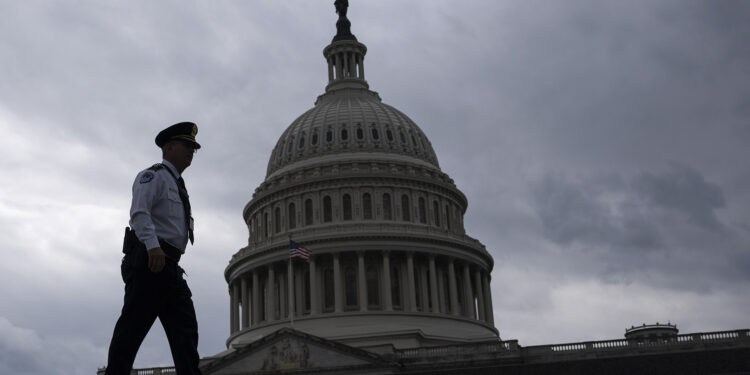The United States risks continuing to have federal debt exceed the size of its GDP, as the public appears indifferent, and the government is unable to reverse the trend.
The American Wall Street Journal reports that the United States’ debt will exceed its gross domestic product this year, a situation that has historical similarities that heralds bleak results for countries whose obligations to pay interest on their debts accumulate, exceeding defense spending.
The newspaper notes that in recent years, both former President Donald Trump and current President Joe Biden have overseen similar increases in the national debt – about $7 trillion each during their terms.
Despite these terrifying numbers, the national response has been largely negative, with neither party significantly addressing the looming financial challenge.
Historian Niall Ferguson recently highlighted the “personal law of history,” which states that “any great power that spends more on debt installments (interest payments on the national debt) than it spends on defense will not remain great for long.”
Ferguson noted that the same thing happened in the Spanish Empire, the Ancien Regime in France, the Ottoman Empire, and the British Empire, and it now looms over the United States.
The Congressional Budget Office (CBO) projects that, due in part to higher interest rates, the federal government will spend $892 billion this current fiscal year on interest payments on the $28 trillion national debt. This interest amount now exceeds budgeted defense spending by $816.7 billion. Billion dollars, which almost matches health care expenditures according to what the newspaper reported.
Budget boom
The newspaper notes that in recent years, Washington has been accumulating debts at an extreme rate. For comparison, in the late 1990s, the federal budget showed a surplus for a short period, while the deficit this year is expected to reach $1.9 trillion.
Ten years ago, government debt was equivalent to about 70% of GDP, while this year it matches GDP and is expected to reach 106% by 2028. By 2034, it is expected to reach 122% of GDP .
Economic consequences
The Congressional Budget Office projects that the debt burden will reduce income growth by 12% over the next three decades, with debt payments crowding out other investments.
Although the heavily criticized Fiscal Responsibility Law helped reduce the deficit this year, historical warnings about escalating debt crises remain strong, according to what the newspaper reported.
Modern monetary theory assumes that countries that control their currencies can always create more money and avoid default, but history offers less reassuring lessons.
Current financial health
The United States may face a debt crisis resulting from a downgrade in the credit rating or the refusal of international financiers to lend, as indicated by the Wall Street Journal.
Treasury Secretary Janet Yellen indicates that stabilizing debt at current levels is reasonable, but warns that extending the tax cuts could worsen the situation.
“If the debt can be stabilized at current levels, we are in a reasonable position,” the minister said in a recent interview with CNBC. However, she warned that further tax cuts without a corresponding increase in revenue or spending cuts could lead to the country’s debt as a share of its economy rising.
Despite the bleak forecasts, there are examples of countries that have successfully stabilized their finances. Britain was able to achieve success in this area before returning to debt, and Canada, Denmark, Sweden and Finland emerged from recent debt crises to return to financial health.
Policy solutions
In the 1980s, concerns about rising debt led to policy changes and a brief period of surpluses in the 1990s. But today, the political will necessary to address the deficit and debt is absent, according to the newspaper.
The debt is rising due to rising interest payments and insufficient tax revenues to cover Social Security and Medicare, with neither party willing to address these entitlement programs.
The newspaper confirms that Republicans and Democrats use religion as a justification for their political preferences, ignoring the need for determination and discipline between the two parties.
The Wall Street Journal points out that going further will require a level of bipartisan discipline and determination that Washington sorely lacks today, although it sometimes existed in the past.
Experts are worried
Historian Paul Kennedy, who wrote the book “The Rise and Fall of the Great Powers” from Yale University, pointed out that America’s current path reflects past great powers that over-extended.
Kennedy warned that by the 21st century, “the aggravation of the national debt and interest payments will divert unprecedented sums of money in this direction.” In a recent interview, Kennedy expressed concern about America’s ability to sustain its debt levels without facing dire economic consequences.
Gerald F. Sieb of the Wall Street Journal highlights these concerns, noting that the American political system has previously responded to debt crises with effective policy changes. However, the current political climate shows little sign of such bipartisan cooperation.



